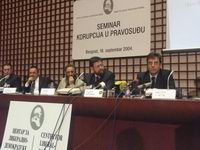- Serbia
Get to know Serbia
- Citizens
Culture and science
Health services
Pension and disability insurance
- Business
Employment
Economy
- Media
- Government
- Contact
Keep in touch
Contact form
Back
Keepin touch
Whether you have a question, comment, suggestion or any problem in the purview of the government, send us your message and we will try to respond as soon as possible. If your problem is not in our purview, we will forward your message to the relevant institution.
Q:
A:
Government stands firm in tackling corruption
Belgrade,
18 September 2004
Serbian Prime Minister Vojislav Kostunica said today that corruption, particularly in the judiciary, is one of the obstacles for the inflow of foreign investments in Serbia.
Addressing the conference pertaining to the corruption in the judiciary, organised by the Centre for Liberal-Democratic Studies, Prime Minister Kostunica said that there is no economic progress and material reconstruction of society without financial and other investments. Those investments, however, are not possible without a legal system to protect the contract as the basic legal institute of the modern civilisation.
Kostunica listed unsatisfactory economic growth, overall social crisis, unemployment and malfunctioning of state institutions as the main reasons for corruption. He said that Serbia is in a difficult position in comparison to other transition countries as it suffers the consequences of wars and international isolation.
Every government finds it difficult to deal with corruption, as every executive authority that wants to prevent corruption in the judiciary faces the dilemma of whether to respect the principles of distribution of powers and give the judiciary the opportunity to fight corruption, or to take part in that struggle risking to be accused of violating the constitutional guarantee for judicial independence, Kostunica said.
This dilemma is even more serious as there is a common belief in our society that the government is in charge of tackling corruption in general, and thus judicial corruption too. If the government says no, it risks to be described as inefficient, Kostunica said.
According to him, there are no convicted holders of judicial functions at the moment, which resulted from the fact that punishment for corruption in this sector was included in the law only recently. Some 20 charges have been pressed so far, but not one verdict has been pronounced, Kostunica said.
The government will try to face corruption in the judiciary by introducing the strictest criteria for the appointment of judges, Kostunica said, adding that the government will provide supervision of the work of the judges as well as stable salaries.
He said that the government is resolute in tackling corruption, which is proven by the prepared bill on preventing the conflict of interest and membership in Group of States Against Corruption (GRECO).
In late 2003, Serbia signed the UN Convention against corruption, he said. The Prime Minister also noted the fact that the Anti-Corruption Council has been set up and that the Ministry of Justice formed a working group for drafting the National Strategy for Fighting Corruption, which should be adopted by the end of the year.
Kostunica listed unsatisfactory economic growth, overall social crisis, unemployment and malfunctioning of state institutions as the main reasons for corruption. He said that Serbia is in a difficult position in comparison to other transition countries as it suffers the consequences of wars and international isolation.
Every government finds it difficult to deal with corruption, as every executive authority that wants to prevent corruption in the judiciary faces the dilemma of whether to respect the principles of distribution of powers and give the judiciary the opportunity to fight corruption, or to take part in that struggle risking to be accused of violating the constitutional guarantee for judicial independence, Kostunica said.
This dilemma is even more serious as there is a common belief in our society that the government is in charge of tackling corruption in general, and thus judicial corruption too. If the government says no, it risks to be described as inefficient, Kostunica said.
According to him, there are no convicted holders of judicial functions at the moment, which resulted from the fact that punishment for corruption in this sector was included in the law only recently. Some 20 charges have been pressed so far, but not one verdict has been pronounced, Kostunica said.
The government will try to face corruption in the judiciary by introducing the strictest criteria for the appointment of judges, Kostunica said, adding that the government will provide supervision of the work of the judges as well as stable salaries.
He said that the government is resolute in tackling corruption, which is proven by the prepared bill on preventing the conflict of interest and membership in Group of States Against Corruption (GRECO).
In late 2003, Serbia signed the UN Convention against corruption, he said. The Prime Minister also noted the fact that the Anti-Corruption Council has been set up and that the Ministry of Justice formed a working group for drafting the National Strategy for Fighting Corruption, which should be adopted by the end of the year.
-
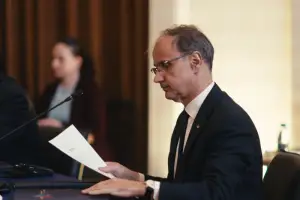 Belgrade/Tirana, 21 November 2025
Belgrade/Tirana, 21 November 2025Connected region best path to full EU membership
-
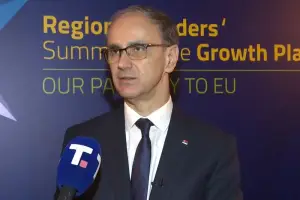 Belgrade/Tirana, 21 November 2025
Belgrade/Tirana, 21 November 2025Serbia on right track in meeting EU accession criteria
-
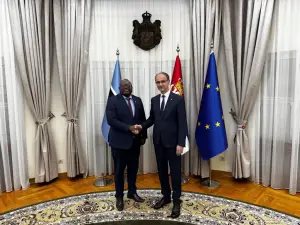 Belgrade, 21 November 2025
Belgrade, 21 November 2025Serbia, Botswana committed to peace, respect for international law
-
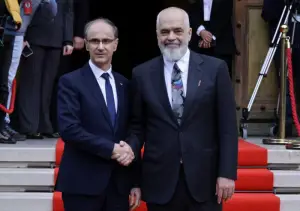 Belgrade/Tirana, 21 November 2025
Belgrade/Tirana, 21 November 2025Prime Minister Macut at Western Balkans Leaders’ Summit
-
 Belgrade, 20 November 2025
Belgrade, 20 November 2025Serbia regional leader in growth, development of ICT services
-
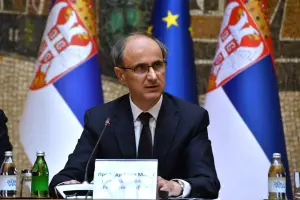 Belgrade, 19 November 2025
Belgrade, 19 November 2025Serbia preserves stability, remains attractive to investors
-
 Belgrade, 19 November 2025
Belgrade, 19 November 2025Partnership with World Bank in maintaining financial stability, implementing reforms
-
 Belgrade, 18 November 2025
Belgrade, 18 November 2025Energy market supply remains stable
-
 Belgrade, 18 November 2025
Belgrade, 18 November 2025Significant contribution of Jewish community to social, cultural life of Serbia
-
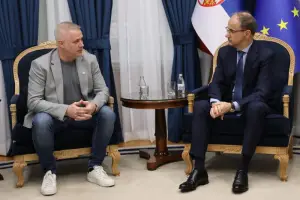 Belgrade, 18 November 2025
Belgrade, 18 November 2025Improvement of Find Me system to enhance citizens’ safety

